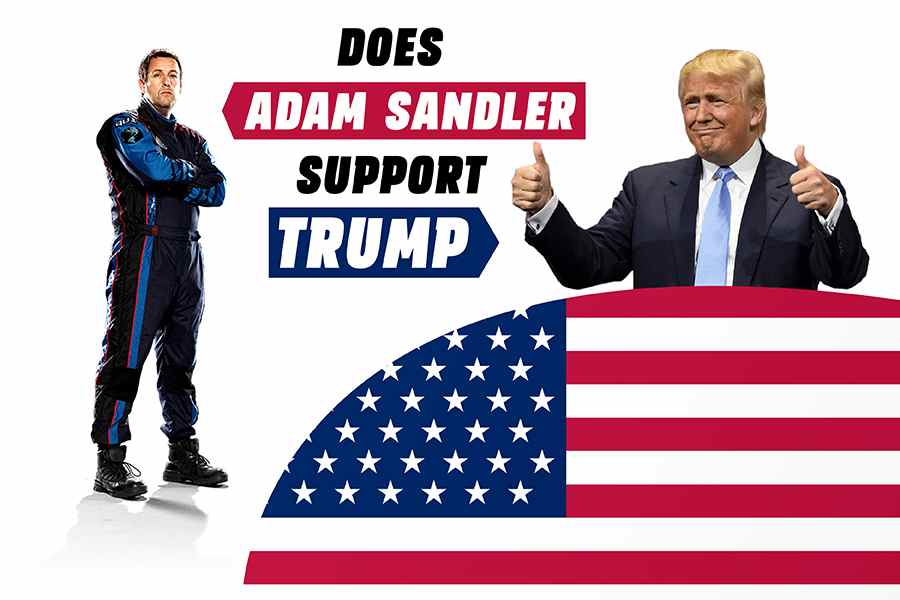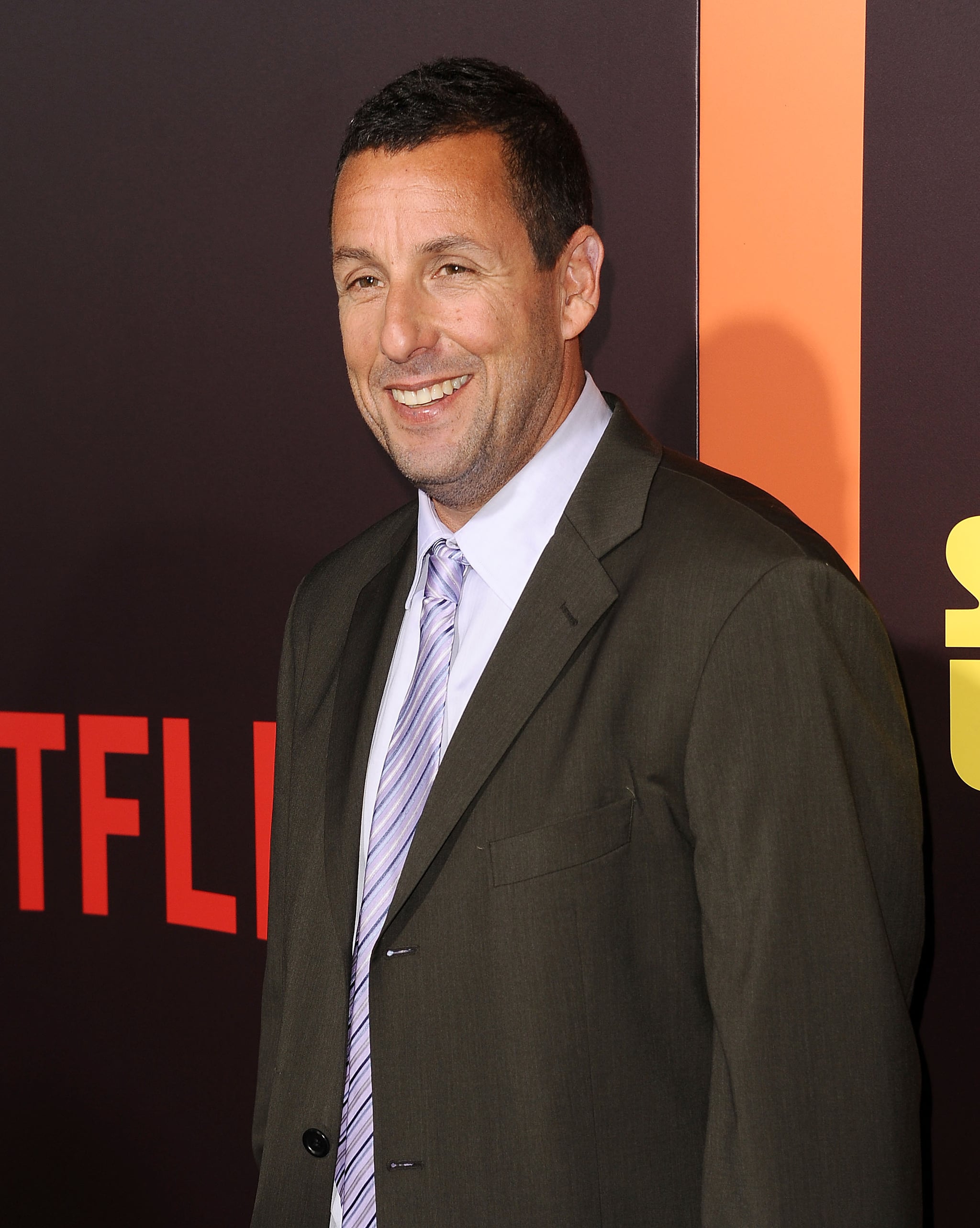Is it possible for a comedic icon to harbor political beliefs that diverge from popular perception? Adam Sandler, a name synonymous with laughter and box office success, presents a fascinating case study in the intersection of celebrity, comedy, and political affiliation.
Sandler's career, spanning decades, has firmly cemented his place in the pantheon of comedic greats. His films, often characterized by a blend of slapstick, heartwarming moments, and relatable characters, have resonated with audiences worldwide. However, beyond the spotlight of his on-screen antics lies a less publicly discussed aspect of his persona: his political leanings. This article delves into the often-speculated world of Sandler's political affiliations, exploring his history, actions, and the potential influences that have shaped his views.
| Category | Details |
|---|---|
| Full Name | Adam Richard Sandler |
| Born | September 9, 1966, Brooklyn, New York |
| Nationality | American |
| Ethnicity | Jewish (of Russian Jewish descent) |
| Education | New York University (attended) |
| Occupation | Actor, Comedian, Producer, Screenwriter, Musician |
| Years Active | 1987present |
| Notable Films | Happy Gilmore, The Wedding Singer, Billy Madison, Little Nicky, 50 First Dates, You Don't Mess with the Zohan, Uncut Gems |
| Awards and Nominations | Independent Spirit Award, Primetime Emmy Awards nominations, Grammy Awards nominations, Golden Globe Award nominations, Screen Actors Guild Award nomination |
| Political Affiliations | Historically associated with the Republican Party. |
| Political Contributions | Contributed to Rudy Giuliani's 2008 Presidential Campaign. |
| Website Reference | IMDB - Adam Sandler |
The question of Adam Sandler's political alignment has intrigued many, particularly given his widespread popularity. Unlike some celebrities who readily share their political views, Sandler has maintained a degree of privacy on this matter. However, certain events and associations have provided hints about his potential leanings.
One of the most significant pieces of evidence often cited is Sandler's performance at the 2004 Republican National Convention. This appearance, a clear indication of at least some level of association with the Republican party, has become a cornerstone in discussions of his political background. Furthermore, reports, including those from The Wall Street Journal on July 18, 2016, have indicated his past registration with the Republican party. These details offer a starting point for understanding his potential political inclinations.
Beyond the convention, Sandler's support for specific Republican candidates provides further insights. He contributed to Rudy Giuliani's 2008 presidential campaign, demonstrating a clear financial backing for a prominent figure within the Republican party. Such actions suggest a level of engagement that goes beyond mere passive support, offering a more direct connection to the political landscape.
It's crucial to acknowledge that despite these historical connections, Sandler has not consistently or publicly expressed support for all Republican ideals or candidates. He has not, for instance, explicitly endorsed Donald Trump, despite being briefly linked to him in the summer of 2019 when a Twitter user claimed to have found Sandler's name on a list of Trump donors. This demonstrates the nuance of his political stances.
Sandlers approach is often a subject of speculation. Some sources suggest that he prefers to keep his political views private, which is a common practice among celebrities. He has occasionally conveyed his perspectives through his comedic work, but it's important to note that these films provide subtle political commentary that are not always indicative of his actual political standpoints. Movies like "You Don't Mess with the Zohan" touch on themes of peace and understanding, but these are not political endorsements, they are artistic expressions.
The comedians connection to the Republican party has often surprised some, particularly those who might perceive his on-screen persona as apolitical or leaning in a different direction. The fact that Sandler has historically been associated with the Republican party is a matter of record, yet the absence of consistent public statements makes it difficult to definitively classify his current political identity.
Understanding Sandler's political affiliations not only sheds light on his personal beliefs but also highlights the role of artists in shaping public opinion. Public figures like Sandler can influence how the public perceives political issues through their work and endorsements, even without explicitly declaring political allegiance. As the 2024 presidential election approaches, the political landscape is a topic of widespread debate. As a result, understanding the positions of major celebrities becomes ever more prevalent.
It is worth noting that in 2019, Sandler reprised his role as "Opera Man," a character from his early days on "Saturday Night Live." In this performance, one of the verses comically mocked Trump, hinting at the comedian's views on certain political figures. This humorous commentary, though indirect, reflects Sandler's awareness and willingness to engage with the political climate.
The entertainment world is full of examples of individuals who dont fit neatly into political boxes. Many celebrities have made donations to both Republican and Democratic candidates, suggesting a nuanced approach to political engagement. Sandlers contributions seem to suggest that he may focus on supporting individual candidates rather than adhering strictly to party lines.
For example, a spokeswoman for Sandler once told The Wall Street Journal that he doesn't like politics. This statement, combined with his historical associations, paints a picture of a celebrity who may have preferences but avoids getting caught up in the partisan fray. It is this complex interplay of actions and statements that makes deciphering Sandlers political views such an interesting and multifaceted endeavor.
The broader context of celebrity political affiliations is also relevant. As the 2024 presidential election cycle approaches, discussions about the political leanings of celebrities like Cardi B and Adam Sandler have become more frequent. These conversations emphasize the increasing role that public figures play in shaping the political narrative and influencing public opinion.
Ultimately, Adam Sandler's political background remains a matter of ongoing discussion. While certain historical associations and actions provide some clarity, the comedians reticence to discuss politics publicly leaves room for continued speculation. This element of mystery is perhaps part of his appeal, allowing his fans to focus on his comedic talent rather than being swayed by strong political opinions.
In conclusion, Adam Sandler's political journey, although complex, is a compelling example of how celebrities navigate the intricate world of politics. As the world continues to speculate, the legacy of Sandler as a comedian remains the most defining aspect of his career. The subtle influences that shape his beliefs continue to be part of the broader discussion about the role of artists in shaping the world.


